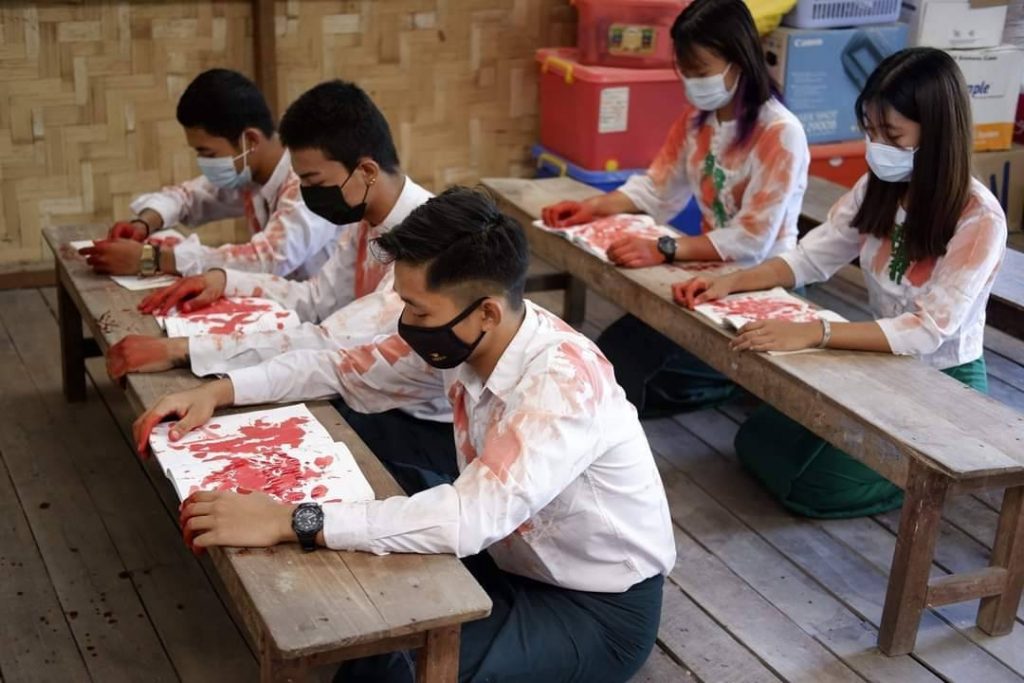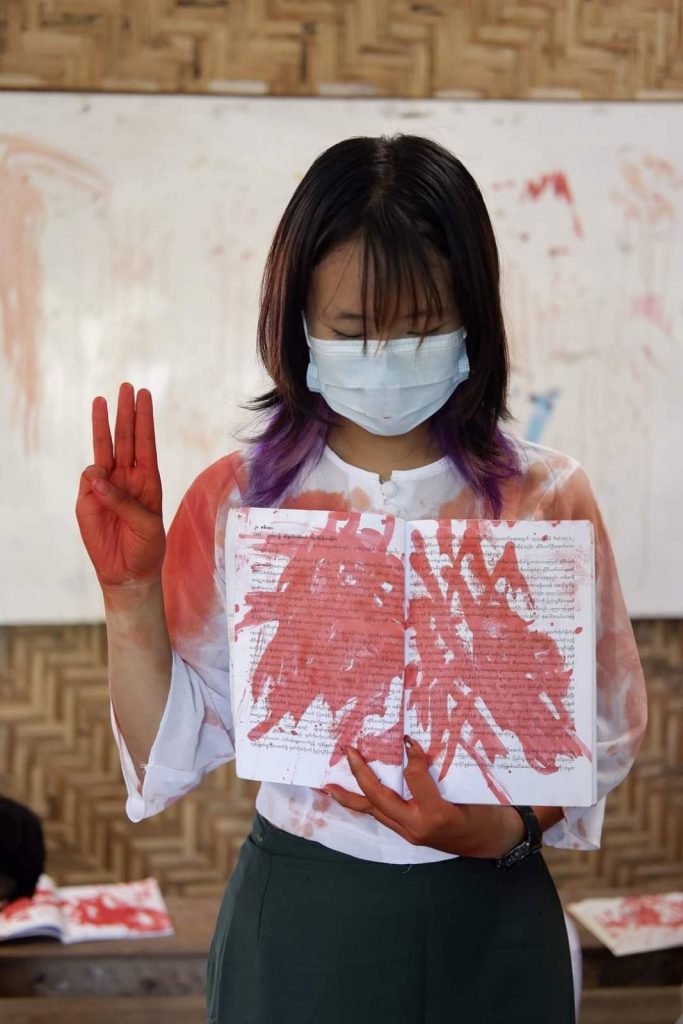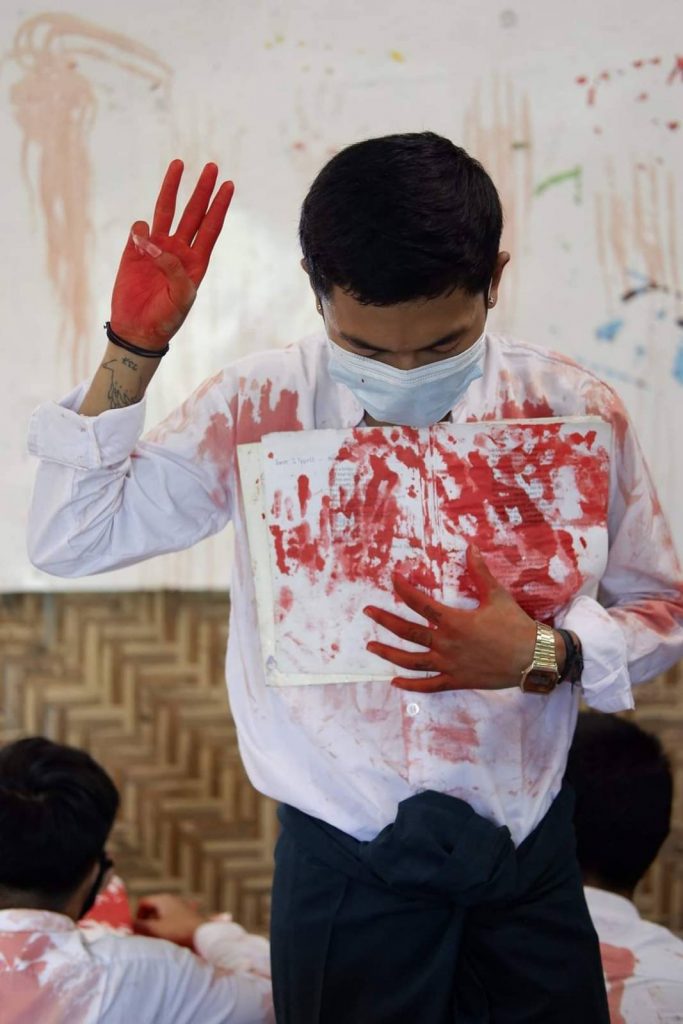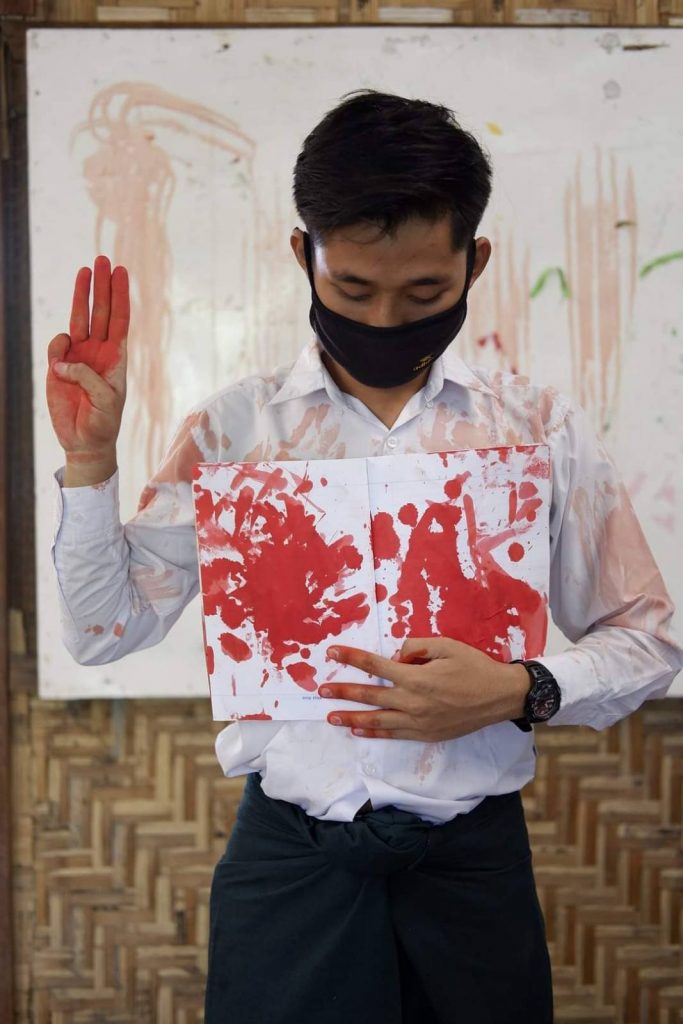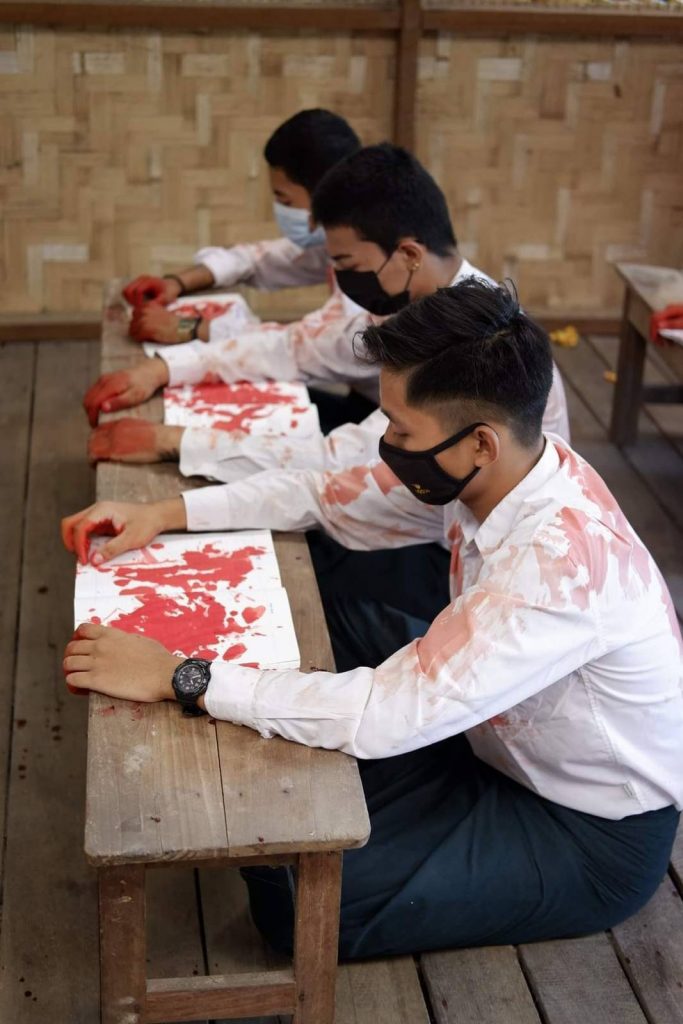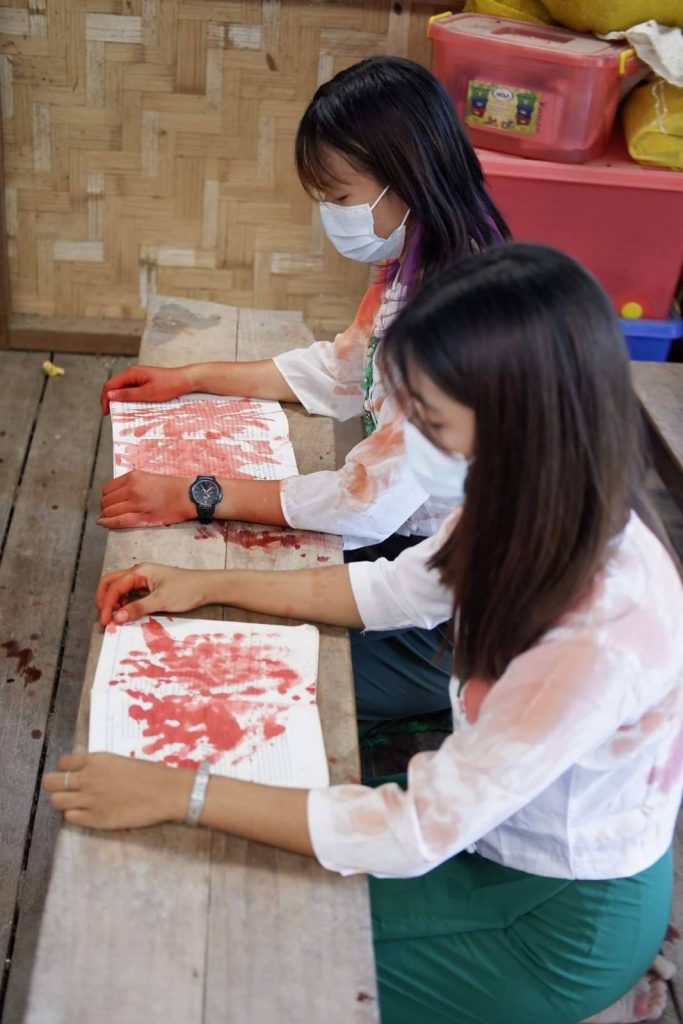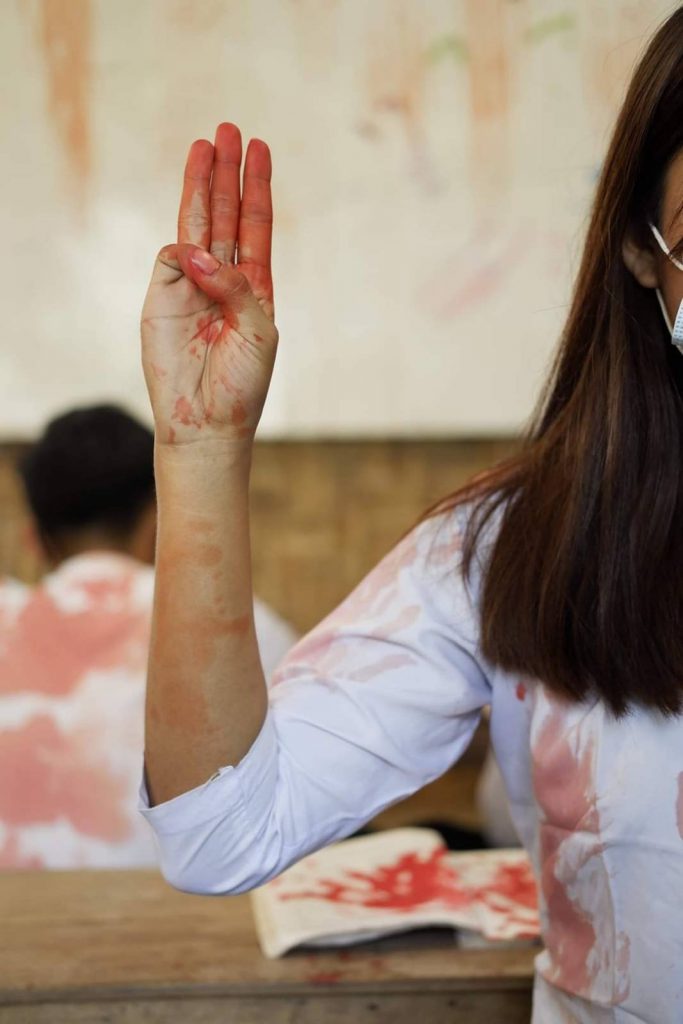With an entire academic year already lost to the pandemic, the junta says schools will reopen on June 1, but teachers, students and their parents are refusing to attend or enroll in schools administered by generals and policed by soldiers.
By FRONTIER
Many parents breathed a sigh of relief in January when the elected government unveiled its plans to reopen schools, which had been closed for nearly a year to prevent the spread of the coronavirus. But on February 1, their hope evaporated.
Three months on from the military coup, the junta is pressing ahead with school re-openings for the start of the next academic year in June. But once again, its plans to continue the policies of the National League for Democracy government it ousted are being foiled by a defiant public.
On April 30, during the daily 8pm newscast on state-owned MRTV, the junta announced that enrollment in basic education schools – as state schools below university level are called – will run from May 24 to 31, with classes resuming on June 1. But many classrooms may still sit empty, thanks to teachers, students and their parents refusing to take part in a military-run “slave education system”.
Scores of Ministry of Education employees including teachers and heads of schools have joined nationwide strikes as part of the Civil Disobedience Movement, and many of the street protests have been led by young students. Meanwhile, junta forces have made barracks of dozens of schools across the country – a move condemned by the United Nations education and children’s agencies, UNESCO and UNICEF, and the international non-government organisation Save the Children. In a joint statement issued on March 19, the three groups called this a “serious violation of children’s rights”.
But despite the importance of children’s education, much of the teaching profession and the wider public are determined to deny the junta a single policy win – and to foil any pretence, after weeks of protest and deadly repression, that Myanmar is now stable. They also feel that, given the neglect and incompetence that marked the previous era of military rule, a junta-run education system would be worthless, and so they have nothing to lose.
“Most teachers won’t return to work because they support the CDM, and most students won’t attend classes to show their opposition to the coup,” said an executive member of the Myanmar Teachers’ Federation who declined to give his name.
‘I will never stop’
Junta chief Senior General Min Aung Hlaing promised at his first news conference after seizing power, held on February 8, to reopen schools as soon as it was safe to do so.
On April 11, junta education minister Dr Nyunt Pe told a meeting of education officials that basic education schools will open on June 1. But he tacitly acknowledged how difficult it may be to hit that target when he then urged striking teachers to return to work, suggesting they were violating the Civil Service Personnel Law by joining the CDM.
Two days prior, on April 9, junta spokesperson Major-General Zaw Min Tun told reporters that striking teachers have been pressuring colleagues who’ve joined ministry-run refresher courses ahead of the reopening, and accused protesters of setting some of the buildings housing these refresher courses on fire. He said more than half of all ministry teachers are attending the courses but are being continually harassed by protesters.
Yet the junta has not even been able to keep its own appointees from defecting. It appointed University of Education, Sagaing rector Dr Saw Pyone Naing as Basic Education Department director on March 2, but Pyone Naing rejected the posting and joined the CDM.
Days before, Dr Daw Shwe Pon, the health minister in the National Unity Government – formed in mid-April by ousted MPs and ethnic leaders as Myanmar’s legitimate government, in defiance of the junta – posted a message from Pyone Naing urging department staff not to return to school and to join the CDM.
“Do not forget: teachers that return to [military-run] schools are betraying their country,” the message said.
The Myanmar Teachers’ Federation estimated in March that about 75 percent of education ministry staff were taking part in the CDM. Although Frontier could not get a more up-to-date estimate for the whole ministry, a federation official said about 60pc of Basic Education Department staff remain on strike.
The MTF official added that more than 70pc of those still on strike have gone into hiding, fearing arrest – or worse: of the more than 750 people killed by the junta since the coup, three have been teachers and five have been students, according to the Assistance Association of Political Prisoners.
Among the more than 3,500 people arrested, charged or sentenced since February 1, 60 are education department staff involved in the CDM and 20 are basic education students that had joined protests. Many have been charged with incitement under section 505A of the Penal Code, which carries a maximum three-year sentence.
On April 25, the junta’s education ministry ordered all teachers to return to schools for preparatory work no later than May 3. Frontier could not find an estimate of how many teachers returned that day, but several sources said that many who did return do not plan to be at school on opening day.
“I will absolutely continue taking part in the CDM until we win. I will never stop boycotting an education system run by the military,” a striking teacher in Mandalay Region who’s gone into hiding told Frontier shortly before the deadline.
Although not targeted by the CDM, private schools are also having a tough time trying to fully resume. With their earnings diminished after a year of closures, many do not have the money to hire back staff, said U Nay Oke, chair of the Myanmar Private Schools Association.
He said the MPSA is still waiting for a response to a request it sent last November to the Ministry of Planning, Finance and Industry for loans to private schools to help them meet operating costs when they reopen.
“I’m very worried that the private education sector will be in disarray [without financial assistance],” he said
He expects only 40pc of Myanmar’s 2,000 private schools to be able to reopen for the coming academic year, with enrollment likely down by 50pc from pre-pandemic levels.
The one exception to these trends – including for state schools – appears to be in Rakhine State, the only region of the country that has not seen large-scale strikes or protests against the junta. U Tin Thein, head of the state’s Basic Education Department, says at least 95pc of the more than 28,000 teachers there have attended refresher courses, and only a few have joined the CDM.
Tin Thein said the department is preparing to open more than 3,000 schools but has yet to receive an official reopening plan from Nay Pyi Taw.
“Rakhine State is mostly peaceful, and I believe all schools will be able to reopen,” he said, alluding to an informal ceasefire that has held since November between the Tatmadaw and the Arakan Army. He added that about 80 schools will have to remain closed because they are in “conflict zones”.
‘Not the right time’
Outside of Rakhine, the determination of many teachers to remain on strike is matched by the resolve of many parents not to send their children to schools under military control, despite having already endured a year of closed schools.
Of the parents of 30 primary, middle and high school students Frontier spoke to in Yangon Region, 21 said they absolutely would not send their children to a government school while the military is in charge, and only two said they definitely would. Others were unsure, or said they would in certain circumstances.
Daw Ei Ei Nyein, 52, whose daughter would otherwise be beginning eighth grade at Yankin Educational Degree College Practicing School, said she doesn’t think it would be safe. At an April 29 press conference, Tatmadaw Captain Daw Aye Thazin Myint said the military council is working with the Ministry of Home Affairs and local administration offices to provide added security “for the safety of teachers and students” – a prospect many students and parents find more terrifying than reassuring.
“I will not send my child to school, even if it reopens,” Ei Ei Nyein said. “There is no guarantee that students will not be arrested or shot, or that female students will not be sexually harassed by soldiers.”
She said she will only send her daughter, Ma Yun Nay Chit Htet, to school “once the elected civilian government returns to power”.
Yun Nay Chit Htet, 15, also refuses to attend for now. She believes doing so would not only be worthless under a “slave education system”, but would also signal a tacit approval of the military dictatorship.
“I’ve made up my mind not to return to school until Mother Suu is released,” she said, referring to ousted State Counsellor Daw Aung San Suu Kyi, who remains under house arrest in Nay Pyi Taw.
The education ministry of the dissident National Unity Government, meanwhile, has voiced support for such a boycott. In an April 26 statement it urged teachers and other education ministry employees not to return to universities or basic education schools until the military regime is ousted.
Ei Ei Nyein hopes her daugher will be able to study some form of vocational training outside of the formal system instead.
“Our uprising against the junta’s coup may take a long time, but it doesn’t matter! I do not want my daughter to receive an educational certificate from the junta. I will teach her important work skills for her future myself,” she said.
One Department of Basic Education teacher and MTF member said that if schools do reopen, he expects enrolment to be down by at least half, if only for security or practical reasons.
“I think most parents are worried about their children’s safety these days,” he said. “Due to the political situation and the shortage of teachers in the department because of the CDM, this is not the right time for basic education schools to reopen.”
COVID mandates
Students were completing the school year in March last year when the country’s first case of COVID-19 was recorded, and final-year high school students were able to take the matriculation exams required for admission to university. However, in its response to the pandemic, the government effectively cancelled the 2020-21 academic year. Although several thousand high schools briefly reopened from July 21 to August 27 after case numbers dropped, all were again closed on August 28 after a second surge in infections was recorded, first in Rakhine and then across the country.
Now, the more than 47,000 basic education schools in Myanmar must pass a 30-point COVID-19 prevention inspection before reopening, ensuring proper sanitation, ventilation and space for social distancing. The junta has trimmed the reopening test from an earlier 80-point one established by the NLD government, but it’s uncertain how many schools will be able to prepare for and pass the test in the next month with their staff diminished by the CDM.
Dr Phyu Phyu Aye, director of the Ministry of Health and Sport’s Public Health Department, declined to answer, insisting the question must be put to the Department of Basic Education, but spokespersons for that department would not take Frontier’s calls.
Daw Win Win Nwe, principal of the Practicing School at the Yangon University of Education in Kamaryut Township, said she had received no instructions on reopening other than that all basic education schools must reopen in June. She said that there had been no inspections to ensure compliance with the health ministry’s COVID-19 prevention measures yet.
Since September 21 last year, the Practicing School has been used as a quarantine centre for citizens returning from overseas.
“Preparations to reopen the school will have to include cleaning and disinfecting the classrooms,” she said.
With teachers and students being shot and arrested, however, COVID-19 precautions seem like the last concern for most students and their parents.
U Soe Soe and Daw Toe Toe Lwin, whose 11-year-old daughter, Ma Aye Myat Thu, was shot in the head by security forces on March 27 as she played in her yard, say they will never send their children to a military-run schools.
The preteen left behind four sisters, one of whom has graduated and one who is not yet of school age.
“We do not dare to enroll our other two daughters if their schools reopen,” Toe Toe Lwin told Frontier. “We lost our beloved daughter, Ma Aye Myat Thu, due to the military’s brutality … We do not want to lose any more children.”


